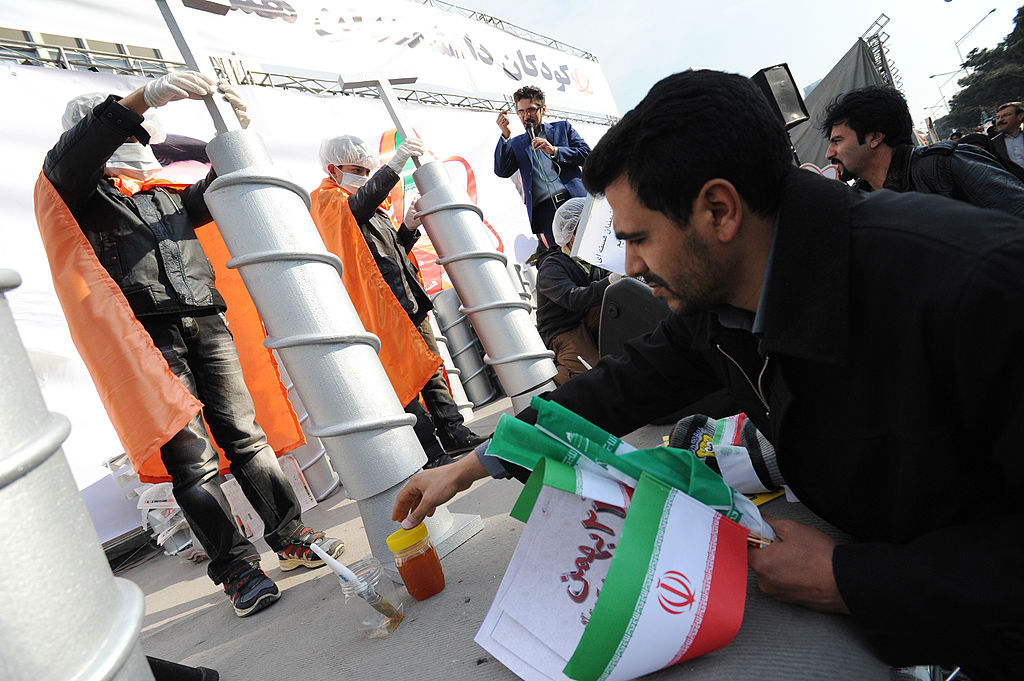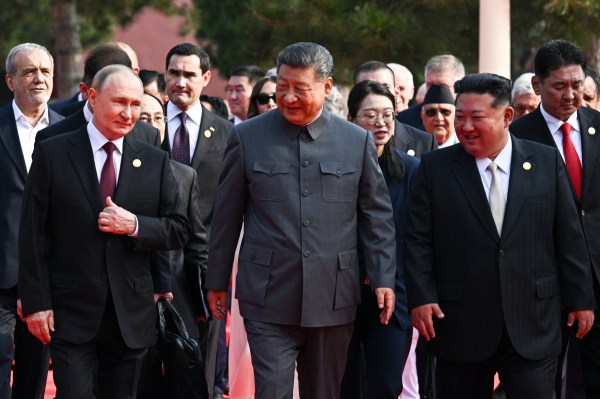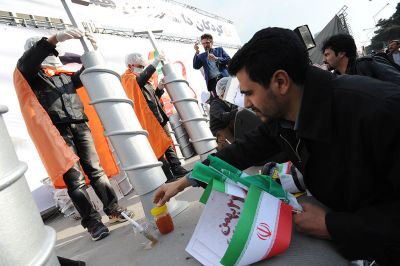Happy Thursday! Nebraska police accused two men this week of killing an American Bald Eagle, which they allegedly planned to cook and eat. Did no one tell these guys the taste of freedom is supposed to be … metaphorical?
Quick Hits: Today’s Top Stories
- Drugmaker Eli Lilly announced Wednesday it will cut prices 70 percent for top-selling insulin products and cap out-of-pocket costs for most patients at $35 a month. The company faced backlash and a stock price drop in November after an imposter falsely tweeted the company would make insulin free, and drugmakers have faced political pressure over climbing prices. About 8.4 million people with diabetes in the United States rely on insulin, and a RAND Corporation report found a vial of insulin cost nearly $100 on average in the U.S. in 2018—about five times more than the second-highest price of about $21 in Chile.
- A review by the CIA and other intelligence agencies of about 1,000 cases of “Havana syndrome”—baffling headaches and other symptoms experienced by diplomats and other officials at embassies—concluded they were “very likely” not caused by a foreign adversary. The report found no pattern linking the individual cases or evidence of directed energy attacks, attributing the symptoms to environmental factors or other illnesses. Previous reviews from an intelligence community panel had concluded directed energy attacks could be responsible for the symptoms.
- Mississippi Gov. Tate Reeves, a Republican, signed into law Tuesday a ban on gender reassignment procedures for minors, making Mississippi the seventh state to limit such treatments. Tennessee’s legislature recently passed a similar bill which GOP Gov. Bill Lee has promised to sign into law, and more than 20 states this year have considered restrictions on puberty blockers, hormone therapy, and gender reassignment surgery for minors.
- Israeli police on Wednesday arrested 39 people and used stun grenades and water cannons on protesters—11 of whom were hospitalized—blocking roads to oppose increased legislative control of Israel’s powerful judiciary. Police also retrieved Prime Minister Benjamin Netanyahu’s wife from a salon surrounded by demonstrators. National Security Minister Itamar Ben-Gvir, who oversees the police, said there must be “zero tolerance toward anarchists” amid the clashes.
- More than 300 students, mostly girls, were reportedly hospitalized in Iran Wednesday in the latest round of suspected poisoning attacks. Some 30 schools in various cities have been affected since November, prompting speculation that attackers are trying to close girls’ schools on the heels of protests sparked by the September death in custody of Mahsa Amini, detained for allegedly violating the country’s religious dress code.
- The Treasury Department on Wednesday sanctioned two North Koreans and three companies it said had raised money for North Korea’s government, violating sanctions intended to block funding for Pyongyang’s weapons development programs. The Treasury Department said North Korea used Chilsong Trading Corp. to “earn foreign currency, collect intelligence, and provide cover status for intelligence operatives” and Paekho Trading Corp. to raise money by “conducting art and construction projects on behalf of regimes throughout the Middle East and Africa.”
Iranian Uranium on the Cranium

Earlier this week, details of a quarterly report from the International Atomic Energy Agency (IAEA)—a United Nations-backed organization that monitors nuclear regimes around the world—emerged, indicating something was amiss at Iran’s Fordo nuclear facility in late January. IAEA inspectors were there in accordance with the “safeguard agreements” to which Iran has been a party since 2003, and they uncovered cascades of advanced centrifuges—used to purify uranium, an element critical to both nuclear power and bombs—reconfigured in a “substantially different” way from Iran’s previous declarations. Samples taken January 22 revealed enrichment of uranium “particles”—not a stockpile—to 83.7 percent purity, well above the 60 percent figure that’d been reported at the facility in November.
Why does any of this matter? The roughly 84 percent purity discovered last month is the highest level of enrichment ever detected in the country, and just shy of the 90 percent threshold considered weapons grade. Though Iranian officials claimed the abnormally high levels were due to “unintended fluctuations” in enrichment rather than intentional moves towards higher purity, Tehran has misled Western officials and journalists repeatedly in the past. For what it’s worth, Massimo Aparo, a high-ranking IAEA official, visited the site last week and, according to Iranian officials, “checked the alleged enrichment rate.” Because the latest IAEA report doesn’t include evidence from Aparo’s visit, Iranian officials have insisted there was no cause for concern.
The head of the IAEA, Rafael Grossi, also plans to visit Iran Friday for high-level meetings with Iranian officials ahead of the IAEA Board of Governors meeting in Vienna on March 6. But it’s not clear what the next steps will be in what has become a pattern of increased enrichment since Iran’s nuclear ambitions were revealed to the world 20 years ago.
“We can’t be in a position where Iran is testing red lines and not meeting a response,” Jason Brodsky, policy director at United Against a Nuclear Iran, told The Dispatch. “That’s the vicious cycle we’ve been in for some years now, and we need to break that cycle.”
While 84 percent enrichment is frighteningly close to 90 percent, it’s also not all that far a technical step from 20 percent—the threshold for what’s known as “highly enriched uranium.” Iran first achieved 20 percent enrichment as early as 2010, years before nations agreed to the 2015 Joint Comprehensive Plan of Action (JCPOA), which sought to cap Iran’s enrichment at just under four percent. After former President Donald Trump withdrew the United States from the deal in 2018, Iran openly resumed 20 percent enrichment at the Fordo facility.
“Having the capability to go to 20 percent and beyond—that really means you have done the lion’s share of enrichment already,” Behnam Ben Taleblu, senior fellow at the Foundation for the Defense of Democracies, told The Dispatch. “Any kind of impediment to enrichment beyond that [20 percent] level is more political than technical,” which Ben Taleblu says makes Tehran’s moves to edge ever closer to 90 percent enrichment less a show of nuclear mastery and more one of political force.
But while the quality of nuclear material is one thing, there’s also a question of quantity. The recent IAEA discovery of particles does not necessarily mean Iran possesses stockpiles of the highly enriched material at its disposal.
That could change in a matter of days. Undersecretary of Defense for Policy Colin Kahl estimated in testimony before Congress on Tuesday that it would take about twelve days for Iran to produce one bomb’s worth of highly enriched uranium. But even then, it would take between one and two years to turn that “fissile material” into an operable bomb—a move that CIA Director Bill Burns said Sunday the agency had no evidence Iran has decided to pursue.
“To the best of our knowledge, we don’t believe that the supreme leader in Iran has yet made a decision to resume the weaponization program that we judge that they suspended or stopped at the end of 2003,” he told CBS’s Margaret Brennan on Face the Nation Sunday.
But whether or not weaponization is on the table right now, analysts argue that the illicit enrichment activities highlight the need to address Iran’s nuclear program head-on.
Technically speaking, the JCPOA remains in effect between the European parties to the agreement and Iran, even as President Joe Biden’s attempts to bring the U.S. back into the fold stall amid the regime’s violent crackdown on ongoing protests. One option is to enact the so-called “snap back” of aggressive sanctions baked into the Iran deal should Tehran fail to comply with the terms of the agreement. The argument that, “if we engage in a policy of sanction stasis, they will engage in a policy of nuclear restraint is totally torpedoed by 84 percent enrichment,” Ben Taleblu said.
But U.S. Special Envoy for Iran Robert Malley has repeatedly sidestepped the idea of reviving the Trump-era “maximum pressure” sanctions campaign, arguing that “sanctions are not the answer.” Perhaps nothing short of full weapons-grade enrichment, argued both Ben Taleblu and Brodsky, could provoke a strong sanctions response from the U.S. and its European allies who remain at least nominally committed to the sanctions relief in the deal.
Israel, a nuclear power and the frequent target of Iran and its regional proxies, is likely considering another attack on Iran’s military or nuclear infrastructure. In January, Israeli drones struck a defense complex near a research facility sanctioned by the U.S. for its involvement in Iran’s ballistic missile program.
In a call with Israeli Prime Minister Benjamin Netanyahu last month, Secretary of State Antony Blinken underscored the United States’ “ironclad commitment to Israel’s security” and “discussed the threats posed by Iran.” High-level Israeli cabinet ministers will visit Washington next week for meetings with Biden administration officials that will focus on Iran, Axios reported Wednesday.
“The only thing that has ever stopped rogue nations from developing nuclear weapons is a credible military threat or a credible military action,” Netanyahu said last week. “A necessary condition and often a sufficient condition is credible military action. The longer you wait, the harder that becomes. We’ve waited very long.”
Worth Your Time
- The roots of Haiti’s current struggles with gang violence and corruption are many and complex, but in Christianity Today, Andy Olsen examines the mixed history of Christian missions on the island and Evangelicals’ role in Haitian politics. The whole piece is worth your time, but the eye-popping statistics of how many Christians have traveled to Haiti caught our attention. “As of 2020, according to the Center for the Study of Global Christianity, roughly 1,700 career missionaries were serving in Haiti—one for every 7,000 people,” Olsen writes. “At one point, something like 85,000 short-termers were traveling there annually, the large majority of them from North America. Picture the entire population of Franklin, Tennessee, flying to Haiti over spring and summer break, then doing it again next year. … So why is Haiti not stronger for it?” (As a companion piece: A Jamaican missionary corrects stereotypes about Haiti.)
- Recently, the best—or only—job for a video game developer in Iran has been working for the regime cranking out games combining “triple-A production values with hardcore Shia doctrine.” Kamiab Ghorbanpour reports for Wired on the political history of video games in the country, the designers who found ways to publish more complex indie games, and how the regime’s violent suppression of recent protests have driven some away from Iran. “Kurosh and his wife, who both work in the industry and had been trying to establish their own studio, joined the street protests in the early months of the movement,” Ghorbanpour writes. “He is now making plans to leave. He still wants to make games, and to honor his heritage and culture, but the space to do so in Iran is shrinking. ‘I love Iran, I have always loved Iran,’ he says. “However, I cannot continue living like this.’”
We promise your day will be improved by clicking this link and scrolling through artificial intelligence renderings of all 46 U.S. presidents with mullets. Here’s a sneak peek of what awaits:
Presented Without Comment
Also Presented Without Comment
Toeing the Company Line
- In the newsletters: Jonah opposes (🔒) the marriage of elitism and populism, Nick asks how (🔒) how the social contagion of apocalyptic thinking might affect U.S. politics over the next few years, the Dispatch Politics team covers Ron DeSantis’ new book, and Scott explains how (🔒) “corporate greed” helped save Europe’s economies.
- On the podcasts: Author Oren Kessler joins The Remnant from Tel Aviv to discuss the history of Arab-Israeli conflict and current changes to Israel’s judiciary, and David and Sarah read the tea leaves as the Supreme Court scrutinizes the Consumer Financial Protection Bureau and Biden’s student loan cancellation.
- On the site: Charlotte looks at why Vladimir Putin may have his sights set on Moldova and Tevi Troy reflects on Watergate and the role of nicknames in American politics.
Let Us Know
How alarmed are you about the prospect of a nuclear-armed Iran? What do you think the U.S. and its allies ought to do to prevent it from coming to pass?








Please note that we at The Dispatch hold ourselves, our work, and our commenters to a higher standard than other places on the internet. We welcome comments that foster genuine debate or discussion—including comments critical of us or our work—but responses that include ad hominem attacks on fellow Dispatch members or are intended to stoke fear and anger may be moderated.
With your membership, you only have the ability to comment on The Morning Dispatch articles. Consider upgrading to join the conversation everywhere.